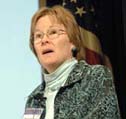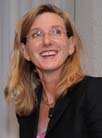 |
 |
 |
 |
 |
   |
|
December 12, 2008
Retreat Refreshes Behavioral, Social Sciences
 Dr. Christine Bachrach
Dr. Christine Bachrach
Dr. Christine Bachrach, acting director of the Office of Behavioral and Social Sciences Research, wanted just one thing out of the first-ever day-long retreat for NIH’s widely dispersed community of behavioral and social scientists, held Nov. 12 at Natcher Bldg.
December 12, 2008
CBT4CBT
New Hope for Treatment of Addiction
 Dr. Kathleen Carroll
Dr. Kathleen Carroll
Drug addiction is notoriously tough to treat, but now research is showing a fresh way to tackle the problem. It’s called computer-based training for cognitive-behavioral therapy (CBT4CBT)
OBSSR’s Mabry Wins with Systems Analysis Team
 OBSSR’s Mabry Wins with Systems Analysis Team
OBSSR’s Mabry Wins with Systems Analysis Team
More News >>
|
  |
|
January 28-29, 2009 Dissemination and Implementation Conference
February 9, 2009, 10:00 – 11:00 AM
Stigma: Lessons & New Directions from a Decade of Research on Mental Illness
July 12-24, 2009
OBSSR/NIH Summer Training Institute on Randomized Clinical Trials Involving Behavioral Interventions
May 3-8, 2009
Institute on Systems Science and Health
May 22-25, 2009
Gene-Environment Interplay in Stress and Health at the Association for Psychological Science 21st Annual Convention, San Francisco, CA
More Events >>
|
|
|
 |
 |
 |
 |
|
Home > News and Events > Lectures And Seminars > Matilda White Riley Annual Lecture
|
Annual Matilda White Riley Lecture |
The Office of Behavioral and Social Sciences Research
(OBSSR)
is pleased to sponsor the annual lecture in the behavioral and social sciences named in
honor of Matilda White Riley (1911-2004). In addition to serving as the Associate Director
for Behavioral and Social Research at the
National Institute on Aging,
Dr. Riley provided leadership across the NIH in her role as chairperson of landmark committees regarding health
and behavior. She was co-chair of the joint ADAMHA and NIH Steering Committee for the Institute of Medicine's
Project on Health and Behavior (1979-1982) and chair of the trans-NIH Working Group on Health and Behavior(1982-1991). In these capacities she served as the senior NIH spokesperson on the behavioral and social
sciences, encouraged coordination among NIH Institutes, oversaw the production of numerous reports to the
Congress on behavioral research at the NIH, provided advice to several NIH Directors, and initiated the
behavioral and social sciences seminar series at the NIH. In effect, she laid the groundwork for
and was the precursor to OBSSR.
The annual award honors an individual whose research has contributed to behavioral and social
scientific knowledge and/or the application of such knowledge relevant to the mission of the
National Institutes of Health. The recipients' research reflects Matilda Riley's commitment
to research characterized by values such as:
- Strong linkages among theory, methods, and research topics/goals;
- Recognition of complexity of and dynamic interplay among processes at multiple levels of explanation (i.e., a biopsychosocial perspective);
- Encouragement of research on behavioral and social factors in physical health and of the application of such knowledge in clinical practice and health policy;
- Advocacy of a life-course perspective, both at the level of individuals and of societies (i.e., development/aging of people and the reciprocal influence of societal processes on development and of people as they develop/age on society);
- Emphasis on the potential for improving the lives of people and society (i.e., research should be significant.);
- Conceptual expansion of “health” beyond biological outcomes (disease and death) to include “effective functioning” (functional health), such as cognitive, affective and social functioning, and quality of life; and
- An optimistic view on the ability of social and behavioral science to develop interventions to improve the lives of people of all ages.
The recipient of the awards delivers a presentation at the National Institutes of Health in
Bethesda, Maryland. OBSSR provides the selected speaker with an honorarium and a suitable
commemorative plaque or sculpture as well as publishes the annual lecture on the OBSSR HomePage.
Past Lectures
Matilda White Riley Lecture Archives
Selection Committee, 2006-2008
Ronald Abeles, OBSSR
Chairperson
Christine Bachrach, NICHD
Virginia Cain, CDC/NCHS
Margaret Chesney, NCCAM
Robert Croyle, NCI
Peter Kaufmann, NHLBI
Richard Suzman, NIA
|
|
|
 |
 |
 |
 |
|
|
 |